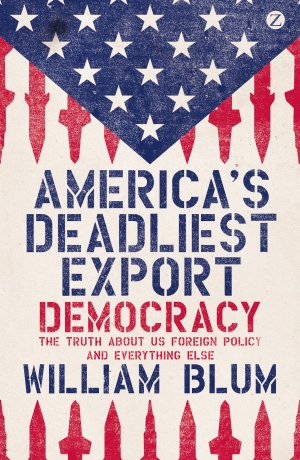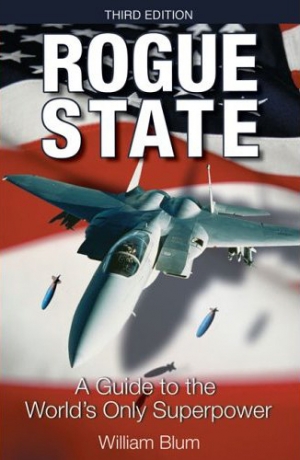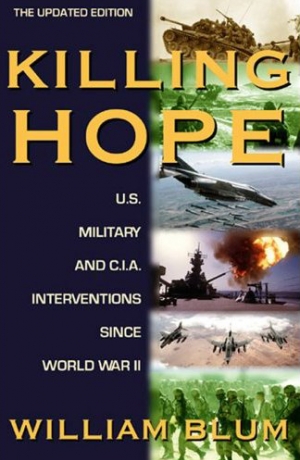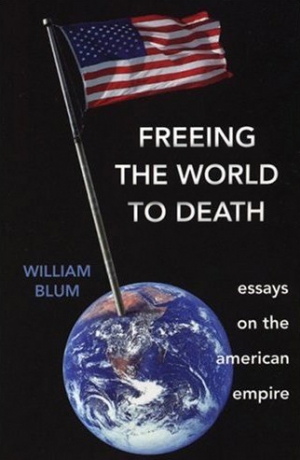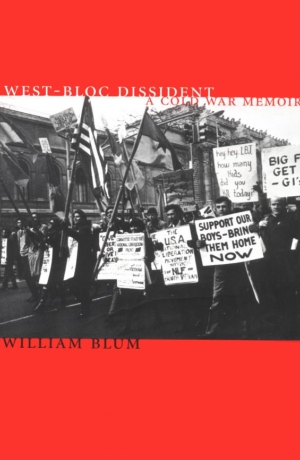The Anti-Empire Report #61
By William Blum – Published September 5th, 2008
Obama-Biden – Osama bin Laden: A coincidence? I think not.
I’m sorry to say that I think that John McCain is going to be the next president of the United States. After the long night of Bush horror any Democrat should easily win, but the Dems are screwing it up and McCain has been running more-or-less even with Barack Obama in the polls. The Democrats should run on the slogan “If you liked Bush, you’ll love McCain”, but that would be too outspoken, too direct for the spineless Nancy Pelosi and her spineless party. Or, “If you liked Iraq, you’ll love Iran.” But the Democrat leadership is not on record as categorically opposing either conflict.
Nor, it seems, do the Democrats have the courage to raise the issue of McCain not having been born in the United States as the Constitution requires. Nor questioning him about accusations by his fellow American prisoners about his considerable collaboration with his Vietnamese captors. Nor a word about McCain’s highly possible role in the brutal Georgian invasion of South Ossetia on August 7. (More on this last below.)
Obama has lost much of the sizable liberal/progressive vote because of his move to the center-right (or his exposure as a center-rightist), and he now may have lost even his selling point of being more strongly against the war than McCain – if in fact he actually is – by appointing Joe Biden as his running mate. Biden has long been a hawk on Iraq (as well as the rest of US foreign policy), calling for an invasion as far back as 1998. 1 In April, 2007, when pressed in an interview about his vote for the war in 2003, Biden said: “It was a mistake. I regret my vote. … because I learned more, like everybody else learned, about what, in fact, we were told.” 2 This has been a common excuse of war supporters in recent years when the tide of public opinion turned against them. But why did millions and millions of Americans march against the war in the fall of 2002 and early 2003, before it began? What did they know that Joe Biden didn’t know? It was clear to the protesters that George W. Bush and Dick Cheney were habitual liars, that they couldn’t care less about the people of Iraq, that the defenseless people of that ancient civilization were going to be bombed to hell; the protesters knew something about the bombings of Vietnam, Cambodia, Laos, Panama, Yugoslavia, Afghanistan; they knew about napalm, cluster bombs, depleted uranium. … Didn’t Biden know about any of these things? Those who marched knew that the impending war was something a moral person could not support; and that it was totally illegal, a textbook case of a “war of aggression”; one didn’t have to be an expert in international law to know this. Did Joe Biden think about any of this?
If McCain had a role in the Georgian invasion of breakaway-region Ossetia it would have been arranged with the help of Randy Scheunemann, McCain’s top foreign policy adviser and until recently Georgia’s principal lobbyist in Washington. As head of the neo-conservative Committee for the Liberation of Iraq in 2002, Scheunemann was one of America’s leading advocates for invading Iraq. One of McCain’s primary campaign sales pitches has been to emphasize his supposed superior experience in foreign policy matters, which – again supposedly – means something in this world. McCain consistently leads Obama in the opinion polls on “readiness to be commander-in-chief”, or similar nonsense. The Georgia-Russia hostilities raise – in the mass media and the mass mind – the issue of the United States needing an experienced foreign policy person to handle such a “crisis”, and, standard in every crisis – an enemy bad guy.
Typical of the media was the Chicago Tribune praising McCain for his statesmanlike views on Iraq and stating: “What Russia’s invasion of Georgia showed was that the world is still a very dangerous place,” and Russia is a “looming threat”. In addition to using the expression “Russia’s invasion of Georgia”, the Tribune article also referred to “Russia’s invasion of South Ossetia”. No mention of Georgia’s invasion of South Ossetia which began the warfare. 3 In a feature story in the Washington Post on the Georgia events the second sentence was: “The war had started, Russian jets had just bombed the outskirts of Tbilisi [Georgian capital].” The article then speaks of “the horror” of “the Russian invasion”. Not the slightest hint of any Georgian military action can be found in the story. 4 One of course can find a media report here or there that mentions or at least implies in passing that an invasion from Georgia is what instigated the mayhem. But I’ve yet to come upon one report in the American mass media that actually emphasizes this point, and certainly none that put it in the headline. The result is that if a poll were taken amongst Americans today, I’m sure the majority of those who have any opinion would be convinced that the nasty Russians began it all. 5
What we have here in the American media is simply standard operating procedure for an ODE (Officially Designated Enemy). Almost as soon as the fighting began, Dick Cheney announced: “Russian aggression must not go unanswered.” 6 The media needed no further instructions. Yes, that’s actually the way it works. (See Cuba, Zimbabwe, Venezuela, Iran, Bolivia, North Korea, Syria, Hamas, Hezbollah, etc., etc.)
The president of Georgia, Mikheil Saakashvili, is an American poodle to an extent that would embarrass Tony Blair. Until their 2,000 troops were called home for this emergency, the Georgian contingent in Iraq was the largest after the US and UK. The Georgian president prattles on about freedom and democracy and the Cold War like George W., declaring that the current conflict “is not about Georgia anymore. It is about America, its values,”. 7 (I must confess that until Saakashvili pointed it out I hadn’t realized that “American values” were involved in the fighting.) His government recently ran a full-page ad in the Washington Post. The entire text, written vertically, was: “Lenin … Stalin … Putin … Give in? Enough is enough. Support Georgia. … sosgeorgia.org” 8
UK prime minister Gordon Brown asserted that Russia’s recognition of the independence of Georgia’s two breakaway regions of South Ossetia and Abkhazia was “dangerous and unacceptable.” 9 Earlier this year when Kosovo unilaterally declared its independence from Serbia, the UK, along with the US and other allied countries quickly recognized it despite widespread warnings that legitimating the Kosovo action might lead to a number of other regions in the world declaring their independence.
Brown’s hypocrisy appears as merely the routine stuff of politicians compared to that of John McCain and George W. re the Georgia fighting: “I’m interested in good relations between the United States and Russia, but in the 21st century, nations don’t invade other nations,” said McCain 10 , the staunch supporter of US invasions of Iraq and Afghanistan and leading champion of an invasion of Iran.
And here is Mahatma Gandhi Bush meditating on the subject: “Bullying and intimidation are not acceptable ways to conduct foreign policy in the 21st century.” 11
Hypocrisy of this magnitude has to be respected. It compares favorably with the motto on automobile license plates of the state of New Hampshire made by prisoners: “Live Free or Die”.
Our beloved president was also moved to affirm that the Russian recognition of the independence of South Ossetia and Abkhazia: was an “irresponsible decision”. “Russia’s action only exacerbates tensions and complicates diplomatic negotiations,” he said. 12 Belgrade, are you listening?
It should be noted that linguistically and historically- distinct South Ossetia and Abkhazia had been autonomous Russian/Soviet protectorates or regions from early in the 19th century to 1991, when the Georgian government abolished their autonomy.
So what then was the purpose of the Georgian invasion of Ossetia if not to serve the electoral campaign of John McCain, a man who might be the next US president and be thus very obligated to the Georgian president? Saakashvili could have wanted to overthrow the Ossetian government to incorporate it back into Georgia, at the same time hopefully advancing the cause of Georgia’s petition to become a member of NATO, which looks askance upon new members with territories in dispute or with military facilities belonging to a nonmember state such as Russia. But the nature of the Georgian invasion does not fit this thesis. The Georgians did none of the things that those staging a coup have traditionally found indispensable. They did not take over a TV or radio station, or the airport, or important government buildings, or military or police installations. They didn’t take into custody key members of the government. All the US/Israeli-armed and trained Georgia military did was bomb and kill, civilians and Russian peacekeeper soldiers, the latter legally there for 16 years under an international agreement. For what purpose all this if not to incite a Russian intervention?
The only reason the United States did not itself strongly attack the Russian forces is that it’s a pre-eminent principle of American military interventions to not pick on anyone capable of really defending themselves.
Unreconstructed cold warriors now fret about Russian expansionism, warning that Ukraine might be next. But of the numerous myths surrounding the Cold War, “communist expansionism” was certainly one of the biggest. We have to remember that within the space of 25 years, Western powers invaded Russia three times – World War I, the “intervention” of 1918-20, and World War II, inflicting some 40 million casualties in the two world wars alone. (The Soviet Union lost considerably more people to international warfare on its own land than it did abroad. There are not too many great powers who can say that.) To carry out these invasions, the West used Eastern Europe as a highway. Should it be any cause for wonder that after World War II the Soviets were determined to close down this highway? Minus the Cold War atmosphere and indoctrination, most people would have no problem in seeing the Soviet takeover of Eastern Europe as an act of self defense. Neither does the case of Afghanistan support the idea of “expansionism”. Afghanistan lived alongside the Soviet Union for more than 60 years with no Soviet military intrusion. It’s only when the United States intervened in Afghanistan to replace a government friendly to Moscow with one militantly anti-communist that the Russians invaded to do battle with the US-supported Islamic jihadists.
During the Cold War, before undertaking a new military intervention, American officials usually had to consider how the Soviet Union would react. That restraint was removed with the dissolution of the Soviet Union in the early 1990s. We may now, however, be witnessing the beginning of a new kind of polarization in the world. An increasing number of countries in the Third World – with Latin America as a prime example – have more fraternal relations with Moscow and/or Beijing than with Washington. Singapore’s former UN ambassador observed: “Most of the world is bemused by western moralising on Georgia” … While the western view is that the world “should support the underdog, Georgia, against Russia … most support Russia against the bullying west. The gap between the western narrative and the rest of the world could not be clearer.” 13 And the Washington Post reported: “Saif al-Islam Gaddafi, Libyan leader Moammar Gaddafi’s influential son, echoed the delight expressed in much of the Arab news media. ‘What happened in Georgia is a good sign, one that means America is no longer the sole world power setting the rules of the game … there is a balance in the world now. Russia is resurging, which is good for us, for the entire Middle East’.” 14
Scheming at the convention?
Am I the only one to be a bit suspicious about what happened at the Democratic Convention on August 27? Why did Hillary Clinton call for a suspension of the roll call when it reached New York and ask that Barack Obama be selected by the convention by acclamation? Many delegates had worked very hard to get the vote out at their primaries and wanted the opportunity to publicly announce the delegate count. What harm would there have been to allow every state to vote?
And why, after Clinton’s motion, did House Speaker Nancy Pelosi immediately cry: “All those in favor, say Aye”, followed by a large roar, and she then cried: “All those opposed say Nay.” It is impossible to say how strong the Nay vote was because the time elapse between Pelosi calling for it and her declaring that “The measure is approved” was no more than one or two nanoseconds. She literally did not allow a Nay vote to be heard.
I also can not find a record of the vote that took place before it reached New York.
Does anyone else find anything strange about all this?
All consciences are equal, except that some consciences are more equal than others
The Bush administration has proposed stronger job protections for doctors and other health care workers who refuse to participate in abortions because of religious or moral objections. Both supporters and critics say that the new regulations are broad enough to allow pharmacists, doctors, nurses and others to refuse to provide birth control pills, Plan B emergency contraception, and other forms of contraception, while explicitly allowing employees to withhold information about such services and refuse to refer patients elsewhere. “People should not be forced to say or do things they believe are morally wrong,” Health and Human Services Secretary Mike Leavitt said. “Health-care workers should not be forced to provide services that violate their own conscience.” 15
It’s difficult to argue against such a philosophy. It’s also difficult to be consistent about it. Do Leavitt and others in the Bush administration extend this concept to those in the military? If a soldier in Iraq or Afghanistan is deeply repulsed by his/her involvement in carrying out the daily horror of the American occupation and asks to be discharged from the military as a conscientious objector, will the Pentagon honor his request because “people should not be forced to do things they believe are morally wrong”? The fact that the soldier voluntarily enlisted has no bearing on the question. A person’s conscience develops from life experiences and continual reflection. Who’s to say at what precise point in time a person’s conscience must rebel against committing war crimes for the objection to be considered legally or morally valid? Signing a contract is no reason to be forced to kill people.
Can a health-care worker strongly opposed to America’s brutal wars refuse to care for a wounded soldier who has been directly involved in the brutality? Can a civilian doctor, pharmacist, or psychologist in the US refuse to treat a soldier on the grounds that if they help to restore his health he’ll be sent back to the war front to continue his killing?
Can peace activists be allowed to withhold the portion of their income taxes that supports the military? They’ve been trying to do this for decades without any government support.
National Pentagon Radio
WAMU, the Washington, DC National Public Radio (NPR) station asked its listeners to write them and tell them what they used the station as a source for. Some of those who replied were invited in for a recorded interview, and a tape of part of the interview was played on the air. I sent them the following email:
June 13, 2008
To: mysource@wamu.orgDear People,
I use WAMU to listen to All Things Considered. I use All Things Considered to get the Pentagon point of view on US foreign policy. It’s great hearing retired generals explain why the US has just bombed or invaded another country. I’m not bothered by any naive anti-war protesters. I get the official truth right from the horse’s mouth. Is this a great country, or what? I hope you’re lining up some more great retired generals to tell me why we had to bomb Iran and kill thousands more people. Just make sure you don’t make me listen to anyone on the left.Sincerely,
William Blum, who should be on Diane Rehm, but never will be asked
[followed by some information about my books]
I had no expectation of any kind of positive reply. I figured that if my letter didn’t do it, then surely the titles of my books would reveal that I’m not actually a lover of the American military or their wars. But I don’t really want to believe the worst about the mainstream media. That’s too discouraging. So it was a pleasant surprise when someone at the station invited me to come in for an interview. It lasted more than half an hour and went very well. I expressed many of my misgivings about NPR’s coverage of US foreign policy in no uncertain terms. The interviewer said he was very pleased. He expected this was going to be an interesting piece for the station to broadcast. But as it turned out, that was the end of the matter. I never heard from the station again, and my interview was never broadcast.
About two months later I sent an email to the interviewer asking if the interview would be aired. I could verify that he received it, but I got no reply. I think the interviewer had been sincere, which is why I’m not mentioning his name. Someone above him must have listened to the tape, remembered where “public” radio’s real loyalty lay (to its primary funder, Congress), and vetoed the whole thing. My (lack of) faith in American mass media has not been challenged. And those who work in the mass media will continue to believe in what they practice, something they call “objectivity”, while I will continue to believe that objectivity is no substitute for honesty.
The audience contributes its share to the syndrome. Consumers of news, if fed American-exceptionalism junk food long enough come to feel at home with it, equate it with objectivity, and equate objectivity with getting a full and balanced picture, or the “truth”; it appears neutral and unbiased, like the living room sofa they’re sitting on as they watch NBC or CNN. They view the “alternative media”, with a style rather different from what they’re accustomed to, as not being objective enough, therefore suspect.
The president of NPR, incidentally, is a gentleman named Kevin Klose. Previously he helped coordinate all US-funded international broadcasting: Radio Free Europe/Radio Liberty (Central Europe and the Soviet Union), Voice of America, Radio Free Asia, Radio/TV Marti (Cuba), Worldnet Television (Africa and elsewhere); all created specifically to disseminate world news to a target audience through the prism of US foreign policy beliefs and goals. He also served as president of Radio Free Europe/Radio Liberty. Would it be unfair to say that Americans then became his newest target audience? All unconscious of course; that’s what makes the mass media so effective; they really believe in their own objectivity. Not to mention the conscious propaganda.
Notes
- See Stephen Zunes, “Biden, Iraq, and Obama’s Betrayal”, Foreign Policy in Focus, August 24, 2008, www.fpif.org/fpiftxt/5492
- “Meet the press”, April 29, 2007, www.msnbc.msn.com/id/18381961/
- Chicago Tribune, August 28, 2008
- Washington Post, August 31, 2008, p.B1
- For further discussion of the Georgia issue, see Robert Scheer, “Georgia War a Neocon Election Ploy?”, The Huffington Post, August 14, 2008; Pat Buchanan, Creators Syndicate column of August 22, 2008; Robert Dreyfuss, The Nation blogs, August 21, 2008
- Reuters, August 10, 2008
- Washington Post, August 9, 2008. p.1
- Washington Post, August 28, 2008, repeated September 1.
- The Guardian (London), September 1, 2008
- See and hear these actual words actually coming out of the actual mouth of the man – http://blog.indecision2008.com/2008/08/13/john-mccain-maybe-doesnt-know-what-the-word-invade-means/
- National Public Radio (NPR), August 15, 2008
- Associated Press, August 27, 2008
- The Guardian (London), August 28, 2008, column by Seumas Milne, quoting from ambassador Kishore Mahbubani’s interview in the Financial Times (London) of August 21
- Washington Post, August 30, 2008, p.18
- Associated Press, August 21, 2008, Washington Post, August 22, 2008
Any part of this report may be disseminated without permission, provided attribution to William Blum as author and a link to williamblum.org is provided.
